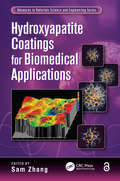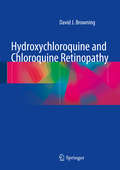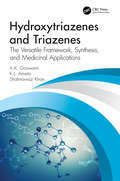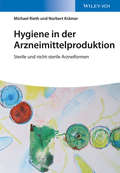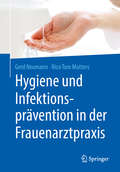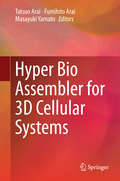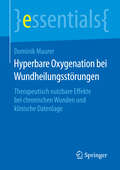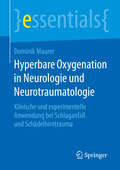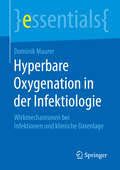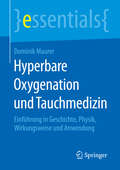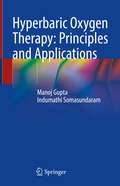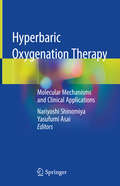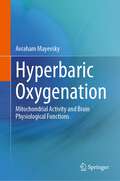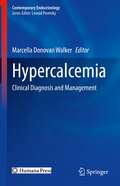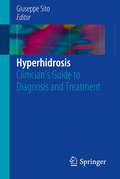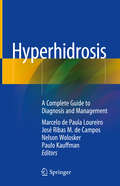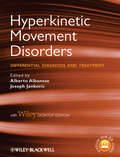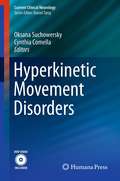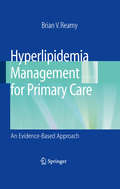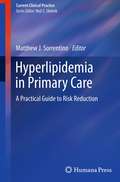- Table View
- List View
Hydroxyapatite Coatings for Biomedical Applications (Advances In Materials Science And Engineering Ser.)
by Sam ZhangHydroxyapatite coatings are of great importance in the biological and biomedical coatings fields, especially in the current era of nanotechnology and bioapplications. With a bonelike structure that promotes osseointegration, hydroxyapatite coating can be applied to otherwise bioinactive implants to make their surface bioactive, thus achieving faster healing and recovery. In addition to applications in orthopedic and dental implants, this coating can also be used in drug delivery. Hydroxyapatite Coatings for Biomedical Applications explores developments in the processing and property characterization and applications of hydroxyapatite to provide timely information for active researchers and newcomers alike. In eight carefully reviewed chapters, hydroxyapatite experts from the United States, Japan, Singapore, and China present the latest on topics ranging from deposition processes to biomedical applications in implants and drug delivery. This book discusses: Magnetron sputtering and electrochemical deposition The modification of hydroxyapatite properties by sol–gel deposition to incorporate other elements found in natural bones, such as zinc, magnesium, and fluorine The use of pure hydroxyapatite in drug delivery applications The growth or self-assembly of hydroxyapatite on shape memory alloy Hydroxyapatite composite coatings—with carbon nanotubes, titanium dioxide (TiO2), and others—on the titanium alloy Offering valuable insights and a wealth of data, including numerous tables and figures, this is a rich source of information for research on hydroxyapatite coatings. Each chapter also covers material that provides an accessible stepping stone for those who are new to the field.
Hydroxychloroquine and Chloroquine Retinopathy
by David J. BrowningMalpractice settlements are large for undetected hydroxychloroquine and chloroquine toxicity which, if untreated, can lead to permanent loss of central vision. Knowledge of the ocular toxicity of these drugs has increased during the past fifty years as their use has expanded. Hydroxychloroquine and Chloroquine Retinopathy is the first single-source book on the subject and is essential for the practicing ophthalmologists, rheumatologists, dermatologists, and internists who prescribe these drugs. It covers clinical topics such as signs and symptoms of toxicity, toxicity screening, ancillary testing, to whom and why the drugs are prescribed and dosing considerations. Additionally, the book addresses practice management considerations, including coding, reimbursement and equipment costs, and the medico-legal responsibilities of the rheumatologist and of the ophthalmologist. Guidelines for the management of hydroxychloroquine and chloroquine vary around the world and differences between the guidelines of the United Kingdom, the United States, and other countries are identified. The book concludes with a collection of case examples illustrating common clinical scenarios and their management. This book is a "must-have" resource for physicians who use these drugs.
Hydroxytriazenes and Triazenes: The Versatile Framework, Synthesis, and Medicinal Applications
by K. L. Ameta A.K. Goswami S. KhanOrganic chemistry research has moved rapidly toward synthesis and medicinal application of nitrogen-containing compounds such as triazenes, triazines, and hydroxytriazenes due to their excellent biological activities. Many of them are presently in clinical trials. Triazene compounds have excellent medicinal properties and limited toxicity. Hydroxytriazenes are excellent chelating agents for transition metals. Newer studies show very promising biological and medicinal applications of these classes of compounds. Hydroxytriazenes and Triazenes: The Versatile Framework, Synthesis, and Medicinal Applications highlights synthetic methods, recent advances, and potential applications of triazines, triazenes, and hydroxytriazenes. This book includes holistic information on synthetic methods for novel compounds based on this moiety, up-to-date information on the how and why of their diverse or even multitargeted medicinal application, and future state of the art of both aspects. Other features include: Highlights recent advances and diverse possible applications of biological functions Covers the chemistry of triazine, triazene, and hydroxytriazene systems On the basis of in silico predictions, the book highlights synthetic methods and their applications A valuable source of information for those actively engaged in medicinal chemistry, drug discovery, and synthetic organic chemistry
Hygiene in Kindertagesstätten: Fragen und Antworten
by Sebastian Schulz-Stübner Ronald GiemullaDas Werk beschreibt verständlich und auf dem neuesten wissenschaftlichen Stand das aktuelle Wissen zur Vermeidung von Infektionskrankheiten in Kindertagesstätten. Es wendet sich v.a. an pädagogische Fachkräfte, wie Erzieherinnen und Erzieher, Auszubildende, Fachberater, Leitungen von Tageseinrichtungen für Kinder, aber auch an interessierte Eltern.Von den klassischen hygienischen Maßnahmen wie Händehygiene, Reinigung und Desinfektion, bis zu den Symptomen der wichtigsten Kinderkrankheiten, notwendige Maßnahmen in der Einrichtung, Therapie und Impfprävention werden übersichtlich dargestellt. Ausgewählte – für die Praxis relevante – Checklisten sowie die wichtigsten Regeln für die Erste Hilfe unter hygienischen Gesichtspunkten runden das Werk ab. Durch den Frage-Antwort-Aufbau der einzelnen Kapitel ist das Werk sowohl für die erste Auseinandersetzung mit hygienischen Themen als auch als Repetitorium für erfahrene Fachkräfte geeignet. Die 2. Auflage erscheint komplett aktualisiert und erweitert.
Hygiene in der Arzneimittelproduktion: Sterile und nicht-sterile Arzneiformen
by Michael Rieth Norbert KrämerSichere und kontaminationsfreie Arzneimittel dank intelligenter Hygienekonzepte und Produktionsabläufe: Dieser neue Praxisleitfaden zu Grundlagen und Verfahren der hygienischen Pharmaproduktion deckt alle gängigen Arzneiformen ab. Von der Personalhygiene über die Herstellungsverfahren der verschiedenen Arzneiformen (fest und flüssig, steril und nicht-steril), von den verwendeten Medien und Hilfsstoffen bis hin zur Verpackung und zur Reinigung der Anlagen werden alle potenziellen Quellen von Kontaminationen unter Berücksichtigung der aktuellen Standards und Prüfverfahren beschrieben und erklärt. Fertigungsleiter und Qualitätsprüfer in der betrieblichen Praxis sowie Sachverständige in Prüf- und Regulierungsbehörden finden hier zahlreiche in der Praxis bewährte Annleitungen zur Optimierung und Gewährleistung einer hygienisch einwandfreien Produktion der unterschiedlichsten Arzneiformen.
Hygiene und Infektionsprävention in der Frauenarztpraxis
by Gerd Neumann Nico Tom MuttersNiedergelassene Frauenärztinnen und Frauenärzte haben die Aufgabe ein Hygienemanagement für ihre Praxis zu etablieren, welches den gesetzlichen und normativen Regelungen entspricht, und so ihre Patienten und Mitarbeiter vor gesundheitlichen Schäden zu bewahren. Dieses Buch unterstützt dabei, im klinischen Alltag die Anforderungen umzusetzen und stellt insbesondere die hygienischen Grundlagen der Desinfektion, Reinigung, Sterilisation, Personalschutz, Abfallbeseitigung und Hygienemaßnahmen zur Infektionsprävention vor. Die Autoren gehen dabei gezielt auf die praktischen Erfordernisse in der Frauenarztpraxis ein. Aus dem Inhalt Infektionen in der Gynäkologie und Geburtshilfe - Hygienische Relevanz für die FrauenarztpraxisAufbau eines Hygieneplans mit konkreten Festlegungen zu notwendigen HygienestrukturenMeldepflichtiger Nachweis von Krankheitserregern und KrankheitenUmgang mit infektiösen Patientinnen, gefährdeten Personenkreisen und deren Materialien
Hygiene-Reiniger im Haushalt: Sinnvoll oder schädlich? Der richtige Umgang und Einsatz
by Günter KampfZahlreiche Hersteller bieten Reinigungs- und Desinfektionsmittel zum häuslichen Gebrauch an, oft mit der Angabe „entfernt 99,9% der Bakterien“.Doch welche desinfizierenden Wirkstoffe werden hier verwendet, um Bakterien, Viren und Pilze abzutöten? Wie wird diese Wirksamkeit bestimmt? Welchen Nutzen kann der Anwender erwarten? Und was sind die Folgen, wenn diese Wirkstoffe so niedrig konzentriert sind, dass weder Bakterien abgetötet noch in ihrer Vermehrung gehemmt werden?Dieser Ratgeber gibt die wissenschaftlich belegten und begründeten Antworten:Warum ist eine routinemäßige Anwendung von desinfizierenden Produkten in Privathaushalten nicht sinnvoll bzw. sogar schädlich.In welchen besonderen Situationen ist die Anwendung welcher desinfizierenden Produkte empfehlenswert bzw. dringend erforderlich.Welche Hygieneregeln sollten im Haushalt - Küche, Bad, Wäschewaschen - grundsätzlich beachtet werden.
Hygienic Modernity: Meanings of Health and Disease in Treaty-Port China
by Ruth RogaskiRuth Rogaski reveals how hygiene became a crucial element in the formulation of Chinese modernity in the nineteenth and twentieth centuries. Rogaski focuses on multiple manifestations across time of a single Chinese concept, weisheng--which has been rendered into English as "hygiene," "sanitary," "health," or "public health"--as it emerged in the complex treaty-port environment of Tianjin.
Hylomorphism into Pieces: Elements, Atoms, and Corpuscles in Natural Philosophy and Medicine, 1400–1600 (Palgrave Studies in Medieval and Early Modern Medicine)
by Nicola Polloni Sylvain RoudautFocussing on late medieval and early modern philosophy and medicine, this edited collection explores the replacement of hylomorphism—the dominant theory of bodies in the Middle Ages—with new theories of matter such as corpuscularianism and atomism at the dawn of the Modern period. Together, the contributions offer a comprehensive overview of a crucial historical moment for the history of philosophy and science: the rise of a new conception of matter against declining scholastic theories. They highlight the key aspects of this historical transition by investigating precise concepts that were central to this shift, namely the notions of elements, atoms, and corpuscles. Shedding light on the gradual process by which hylomorphism was eventually replaced by a more positive conception of matter and natural processes, the book demonstrates how many thinkers of the late medieval period were willing to integrate new theories into the conceptual framework of Aristotelian natural philosophy, and tried to harmonise them with the traditional concepts and axioms of scholastic doctrines. Showing how these conceptual innovations resulted from a complex interaction between different fields of late medieval and early modern knowledge, the authors bring together research from the disciplines of metaphysics, medieval philosophy, and medical science. Providing an overview of an important theoretical shift in the transition from the Middle Ages to the Modern Era, this book is essential reading for scholars of philosophy, and historians of medieval and early modern science and medicine.
Hyper Bio Assembler for 3D Cellular Systems
by Tatsuo Arai Fumihito Arai Masayuki YamatoHyper Bio Assembler for Cellular Systems is the first book to present a new methodology for measuring and separating target cells at high speed and constructing 3D cellular systems in vitro. This book represents a valuable resource for biologists, biophysicists and robotic engineers, as well as researchers interested in this new frontier area, offering a better understanding of the measurement, separation, assembly, analysis and synthesis of complex biological tissue, and of the medical applications of these technologies. This book is the outcome of the new academic fields of the Ministry of Education, Culture, Sports, Science and Technology's Grant-in-Aid for Scientific Research in Japan.
Hyper-chondriac: One Man's Quest to Hurry Up and Calm Down
by Brian FrazerDoes your blood pressure surge if the car in front of you turns without signaling? Do your neck veins pulsate when a cashier takes too long to ring you up? Does relaxing seem like it'll have to wait until you're dead? Then your name could very well be Brian Frazer. On paper, Frazer is the world's healthiest guy. He eats right, exercises regularly, gets plenty of sleep, has never smoked and has missed only one day of flossing in the last five years. But inside he's a swirling vortex of angst, capable of contracting a new malady every month. Once Frazer realized that all his ills were tied to stress, he went on a quixotic quest for calm, venturing into everything from Tai Chi, serotonin blockers and Kabbalah to an unfortunate incident involving pineapple-chicken curry at a Craniosacral therapy session. Never has the road to wellville taken so many unforeseen turns. Achingly funny, uncomfortably true and always entertaining, Hyperchondriac is just the medicine for anyone who wants to take it down a notch.
Hyperbare Oxygenation bei Wundheilungsstörungen: Therapeutisch nutzbare Effekte bei chronischen Wunden und klinische Datenlage (essentials)
by Dominik MaurerIn diesem essential erhält der Leser grundlegende Einblicke in die Wirkungsweise der hyperbaren Oxygenation (HBO) auf die verschiedenen Prozesse der Wundheilung. Der Einsatz der HBO bei chronischen Wunden wie dem diabetischen Fußsyndrom sowie strahleninduzierten Gewebsschäden ergibt sich vor allem aus der positiven Beeinflussung der Wundheilungsprozesse über Induktion von Gefäßneubildung und Kollagenisierung. Im Rahmen eines multimodalen Therapiekonzeptes kann die HBO so gezielt bei Wundheilungsstörungen eingesetzt werden, von denen immungeschwächte Personen mit Diabetes mellitus sowie Tumorpatienten unter Strahlentherapie häufig betroffen sind. Die hier vorliegende Auswertung der klinischen Datenlage der letzten beiden Jahrzehnte bestätigt die positiven HBO-Effekte beim diabetischen Fußsyndrom sowie den verschiedenen Formen der Strahlennekrose.
Hyperbare Oxygenation in Neurologie und Neurotraumatologie: Klinische und experimentelle Anwendung bei Schlaganfall und Schädelhirntrauma (essentials)
by Dominik MaurerIn diesem essential erhalt der Leser einen grundlegenden Einblick in die Anwendungsmoglichkeiten der hyperbaren Oxygenation bei der Behandlung des akuten ischamischen Insults sowie des Schadelhirntraumas aus experimenteller wie auch aus klinischer Sicht. In der Neurotraumatologie wird die hyperbare Oxygenation sowohl in der Akutphase nach Schadelhirntrauma als auch zur Behandlung chronischer Folgeschaden herangezogen. Der Hauptangriffspunkt der HBO liegt dabei in der Begrenzung des sekundaren Hirnschadens durch Inhibierung der neuronalen Apoptose. Es konnten experimentell jedoch auch neuroregenerative HBO-Effekte nachgewiesen werden. In der Behandlung neuro-psychiatrischer Folgeschaden nach Schadelhirntraumata zeigt sich eine deutliche Uberlegenheit einer HBO unter reduziertem Behandlungsdruck (low-pressure-HBO). "
Hyperbare Oxygenation in der Infektiologie: Wirkmechanismen bei Infektionen und klinische Datenlage (essentials)
by Dominik MaurerDieses essential informiert über die aktuellen Erkenntnisse der Wirkmechanismen der hyperbaren Oxygenation (HBO) bei Weichteilinfektionen. Der Autor gibt eine Übersicht über die gegenwärtige klinische Datenlage zur HBO in der Infektiologie. Zentrale Wirkmechanismen der HBO sind dabei die direkten antibakteriellen Effekte hyperbaren Sauerstoffs, die Verbesserung der leukozytären Phagozytose sowie synergistische Effekte zwischen HBO und Antibiotika. Experimentelle und klinische Anwendungen der HBO in der Infektiologie umfassen neben nekrotisierenden Weichteilinfekten auch chronische Osteomyelitiden, opportunistische Pilzinfektionen sowie zerebrale Weichteilinfektionen. Klinisch resultieren aus dem HBO-Einsatz deutliche Verbesserungen der Mortalität und Morbidität der Patienten, obgleich noch nicht alle klinischen Resultate mit experimentellen Erkenntnissen zur HBO-Wirkung belegt werden können.
Hyperbare Oxygenation und Tauchmedizin: Einführung in Geschichte, Physik, Wirkungsweise und Anwendung (essentials)
by Dominik MaurerIn diesem essential geht es um die physikalischen und physiologischen Grundlagen der Hyperbaren Oxygenation (HBO), einer sicheren und komplikationsarmen Therapieform zur Behandlung von Gasembolie und Dekompressionserkrankung. Primär bekannt in der Tauchmedizin haben sich aber im Laufe der letzten Jahrzehnte eine Reihe neuer Indikationen in der klinischen Medizin zur HBO etabliert, die hier beschrieben werden. Physikalisch geht bei der HBO auf der Basis der Gasgesetze ein Vielfaches der bei atmosphärischem Druck physikalisch im Blutplasma gelösten Sauerstoffmenge in Lösung über. Die HBO führt so zu funktionellen Veränderungen an Gefäßen, Blutzellen, Enzymen und Bakterien, sowie morphologischem Gewebsumbau durch Wachstumsförderung von Gefäßen, Bindegewebe und Nerven. Das heutige Verständnis der HBO, die technische Umsetzung und Durchführung sind Ergebnisse einer über Jahrhunderte laufenden Entwicklung und der Verdienst von Pionieren der Wissenschaft, vor allem auf den Gebieten der Physik und Medizin.
Hyperbaric Oxygen Therapy: Principles and Applications
by Manoj Gupta Indumathi SomasundaramThis book covers the hyperbaric oxygen therapy (HBOT) in current recommended indications, emphasizing the mechanisms involved in the benefits of supplemental oxygen under high pressure. The physiological changes associated with high pressure and hyperoxic conditions are discussed in initial chapters, along with their physical basis governed by the laws of gas followed by the functioning of hyperbaric chambers and the safety precautions needed in operating them. Utilization of HBOT in indications such as wound healing, severe anemia, and burn injuries is thoroughly explained, along with the recommended protocol for HBOT administration. The final chapters present the contraindications of HBOT and its promising effects on aging and regeneration.This book is helpful to HBOT practitioners in understanding its underlying mechanism and major applications.
Hyperbaric Oxygenation Therapy: Molecular Mechanisms and Clinical Applications
by Nariyoshi Shinomiya Yasufumi AsaiThis book focuses on hyperbaric oxygenation (HBO) therapy from the molecular biology perspective and its clinical applications, including molecular mechanisms of HBO’s positive effect on cellular function in hypoxic tissues.HBO is a therapeutic tool that enhances oxygen supply to hypoxic tissues and improves wound healing/tissue remodeling. Currently HBO therapy is applied to a wide range of clinical cases, which include not only acute hypoxic diseases but also many chronic and refractory diseases involving tissue hypoxia or intractable infection. HBO therapy is a well-recognized regimen for many researchers and clinicians. The first half of the book outlines basic molecular mechanisms of HBO and their potential applications for clinical activities, while the second half describes the rationale behind introducing HBO therapy into suitable clinical cases and presents successful clinical reports. It is primarily written for HBO clinicians, physiologists and basic research scientists, but is also of interest to clinicians who have an interest in this field considering introducing HBO therapy.
Hyperbaric Oxygenation: Mitochondrial Activity and Brain Physiological Functions
by Avraham MayevskyExposure of patients to a high oxygen environment is a standard treatment in a select group of patients. The development of oxygen toxicity must be avoided in those patients. This book describes the effects of normobaric and hyperbaric oxygen treatment of animal models on brain biochemical and physiological responses. This book provides a summary of our knowledge on the effects of hyperbaric oxygenation on mitochondrial activity in vivo, and other functions of the brain. A chapter covering the use of hyperbaric hyperoxia in patients’ brain pathology and care is also included. This is an ideal book for students, research groups, and clinicians studying hyperbaric oxygen and its connection to mitochondrial activity and brain physiological functions.
Hypercalcemia: Clinical Diagnosis and Management (Contemporary Endocrinology)
by Marcella Donovan WalkerWhile there are some books that include discussions of individual causes of hypercalcemia, there are none that provide basic guidance on the approach, diagnosis and treatment of hypercalcemia, while also offering an in-depth, detailed, state-of-the-art review of the individual causes by world-renowned experts in the field. Topics discussed include pathophysiology, differing diagnostic strategies for both the pediatric and adult patient, the various forms and causes of hypercalcemia as well as current treatment regimens and algorithms. Selected chapters are enhanced with illustrative cases, thereby complementing theoretical matter with real-world applications to the practice of medicine, and tables and figures allow the reader to solidify concepts in an easily digestible format. By integrating an evidence- and guideline-based framework along with an up-to-date, research-based summary of each cause, Hypercalcemia is relevant for expert clinicians and up-and-coming medical students alike.
Hyperhidrosis
by Giuseppe SitoThis book is designed to serve as a rapid reference onthe diagnosis and treatment of hyperhidrosis that will meet the needs ofplastic surgeons, dermatologists, and other practitioners. It offersup-to-date, step-by-step guidance on all the therapeutic options, with aspecial focus on the role of botulinum toxins and concise coverage of oralmedications, surgical procedures, and iontophoresis. In addition, helpfulinformation is provided on epidemiology, pathogenesis, clinical features,classification, management of complications of hyperhidrosis, and psychologicalcare. Important management strategies and maneuvers are also illustrated bymeans of color photos. The book will be an invaluable source of verifiedknowledge and clear advice for all clinicians responsible for the care ofpatients with hyperhidrosis.
Hyperhidrosis: A Complete Guide to Diagnosis and Management
by Marcelo De Loureiro José Ribas Campos Nelson Wolosker Paulo KauffmanHyperhidrosis is a medical condition in which a person sweats excessively and unpredictably. People with hyperhidrosis may sweat even when the temperature is cool or when they are at rest.Despite prevalence of at least 1% of the global population, Hyperhidrosis is still an unknown entity, for the most part -- an undertreated and even neglected medical condition. Moreover, there are few sources summarizing the knowledge on hyperhidrosis to a wider audience. The purpose of this book is to provide information regarding hyperhidrosis, ranging from basic information on pathophysiology to the most advanced therapeutic alternatives. From a therapeutic perspective, hyperhidrosis requires clinical treatment using topical and subdermal agents as well as surgical approaches. The book will not only cover these topics but will discuss all aspects of care -- from patient selection through post-surgical complications. Special attention will be given to sympathectomies. Medical and paramedical professionals, as well as students and researchers, interested in the topic will find the book comprehensive in scope and targeted in offering practical, clinical guidance. Diagnosis and Treatment of Hyperhidrosis - A Complete Guide counts with the collaboration of most renowned specialists of this field, and is intended as an easy to read and very practical reference book.
Hyperkinetic Movement Disorders
by Joseph Jankovic Alberto AlbaneseHyperkinetic movement disorders comprise a range of diseases characterized by unwanted and uncontrollable, or poorly controllable, involuntary movements. The phenomenology of these disorders is quite variable encompassing chorea, tremor, dystonia, myoclonus, tics, other dyskinesias, jerks and shakes. Discerning the underlying condition can be very difficult given the range and variability of symptoms. But recognizing the phenomenology and understanding the pathophysiology are essential to ensure appropriate treatment.Hyperkinetic Movement Disorders provides a clinical pathway for effective diagnosis and management of these disorders. The stellar international cast of authors distils the evidence so you can apply it into your practice. The judicious use ofdiagnostic criteriaalgorithmsrating scalesmanagement guidelinesProvides a robust framework for clear patient management. Throughout the text, QR codes* provide smartphone access to case-study videos of hyperkinetic symptoms.Purchase includes an enhanced Wiley Desktop Edition.* This is an interactive digital version featuring:all text and images in fully searchable formintegrated videos of presentationsView a sample video: www.wiley.com/go/albanesehighlighting and note taking facilitiesbook markinglinking to additional referencesHyperkinetic Movement Disorders provides you with the essential visual and practical tools you need to effectively diagnose and treat your patients.*Full instructions for using QR codes and for downloading your digital Wiley DeskTop Edition are inside the book.
Hyperkinetic Movement Disorders
by Oksana Suchowersky Cynthia ComellaHyperkinetic Movement Disorders is a state-of-the-art resource devoted to disorders characterized by excessive movement. Organized according to specific disorders or syndromes, each chapter is written by a group of internationally recognized experts. Chapters have been organized by the individual authors to best highlight the salient features of the disorders. Each chapter features a video accompaniment that provides highly instructive examples of each disorder, offering clinicians an important video-based tool to aid in making correct diagnoses. The video is on an accompanying DVD and can also be found at www.springerimages.com/Suchowersky. Without a visual evaluation of the phenomenology, diagnosis of the hyperkinetic disorder is fraught with error. Hyperkinetic Movement Disorders is a unique and essential new text written for neurologists, psychiatrists, neurosurgeons, internists, residents and all others interested in movement disorders. An invaluable resource, it will lead to a better understanding and recognition of the hyperkinetic movement disorders, and that, in turn, will lead to better care for patients.
Hyperlipidemia Management for Primary Care
by Brian V. ReamyThis book provides multifaceted strategies necessary to treat hyperlipidemia, as well as tips for incorporating techniques into clinical practice. In addition to discussing pharmacologic treatment, the book includes a review of popular diets and therapeutic foods, herbs, and vitamins. A section on evidence-based recommendations for treating special populations discusses approaches for elderly patients, women, elite athletes, and other populations with unique medical needs. Case studies illustrate the principles introduced in the book. The text is complete with screening tools for real world risk assessment.
Hyperlipidemia in Primary Care
by Matthew J. SorrentinoCardiovascular disease is the number one cause of death for men and women in this country, surpassing deaths due to all cancers combined. Better awareness of heart disease risk factors and improved treatment modalities has produced great progress in reducing deaths due to myocardial infarction and stroke over the past few decades. Still, more progress is needed, as about half of all first coronary events occur in individuals who have no cardiac symptoms and no previously diagnosed heart disease. The primary care physician, therefore, has an important role in identifying at risk individuals and beginning preventive modalities. In Hyperlipidemia in Primary Care: A Practical Guide to Risk Reduction, a group of leading authorities in the field offers a comprehensive overview of the problem along with practical strategies for treating it. This unique title reviews methods for assessing risk in patients, including an important and thorough discussion of the Framingham algorithm and its limitations and advantages in assessing CVD risk. The book also reviews the evolving world of lipidology and how to apply many of the newer lipid tests to patients in daily practice, putting these tests into proper perspective and offering a rational approach to using them in practice. Finally, treatment issues are covered. As treatment has expanded to more risk groups, a number of different guidelines have been published with recommended lipid goals. This is an evolving area of research with rapidly changing guidelines that are expanding the pool of high risk patients. An invaluable reference that offers a reasonable approach to risk assessment and treatment of individuals at increased cardiovascular risk, Hyperlipidemia in Primary Care: A Practical Guide to Risk Reduction provides the background needed to make scientifically based decisions that can ultimately help greatly reduce the number of patients impacted by cardiovascular disease.
